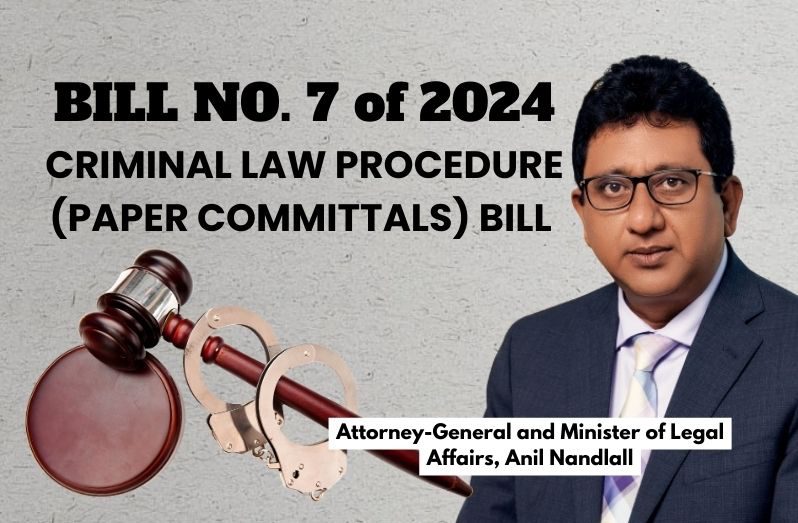-aims to reduce backlog of indictable cases, transform the criminal justice system
GUYANA is one step closer to abolishing preliminary inquiries (PIs) in the Magistrate’s Court for indictable criminal offences. This is part of government’s efforts to reduce the time persons charged with these offences spend on remand while awaiting trial in the High Court.
According to Minister of Legal Affairs and Attorney-General, Anil Nandlall, S.C., the Criminal Law Procedure (Paper Committal) Bill which aims to overhaul the criminal justice system, is scheduled for a second reading and debate in Parliament later this month.
“That’s another critical piece of legislation that will impact the criminal justice system in a fundamental way. In that legislation, we will completely move away from oral preliminary inquiries, and we will treat exclusively with paper committals.
“That should bring tremendous relief to the workload in the administration of criminal justice, bring speed to the disposal of cases and have a positive impact on our growing prison population,” Nandlall said on Thursday during the commissioning of the Children’s Court at the Wales Magistrate’s Court.
The basic PI procedure is set out in the Criminal Law (Procedure) Act, Chapter 10:01 which involves the taking down in writing of oral evidence given under oath before the magistrate.
The written documents, signed by the witnesses and magistrate, are termed depositions. If the magistrate is of the opinion that the evidence has established a prima facie case, that is, a sufficient case for the accused to answer at trial on indictment in the High Court before a judge and jury, the accused person must be cautioned and given an opportunity to give oral evidence and to adduce evidence of any witnesses.
Any such evidence given by the accused or witnesses will be taken down in writing, signed by those testifying and the magistrate, and kept with the depositions.
The procedure was amended by the Criminal Law (Procedure) (Amendment) Act 2008 to enable evidence to be adduced at PI proceedings by way of statements, documents, writings, and other articles tendered in the absence of the witnesses, but the magistrate may require certain witnesses to attend to give oral evidence and to be cross-examined.
In cases of proceedings concerning sexual offences, the Sexual Offences Act, 2010, provides for a new procedure of paper committals (that is, committals based on written statements, documents, and depositions, with no oral PI).
If the magistrate determines that the oral and/or written or other evidence adduced at the PI does not make out a sufficient case to commit the accused for trial before judge and jury for any indictable offence disclosed by the evidence, the accused must be discharged by the magistrate.
The discharge does not, however, amount to an acquittal, as a PI is not a trial. The Director of Public Prosecutions (DPP) holds statutory power to remit the case to the magistrate with directions to reopen the PI and to commit the accused for trial.
There have been cases where more than one PI was held in the Magistrates’ Court, resulting in long delays in bringing the accused to jury trial.
During the last sitting in May, the National Assembly passed Criminal Procedure (Plea Discussion and Plea Agreement) Bill which seeks to repeal the Criminal Procedure (Plea Bargaining and Plea Agreement) Act Cap 10:09.
According to Nandlall, “This plea-bargaining law is intended to bring speed to the system to bring efficiency to the system and to save billions of dollars in judicial resources. It allows the prosecution and the accused person to sit and work out a deal if the accused person wants to plead guilty, then that deal is entered, but there are a number of safeguards; the victim’s interest has to be taken into account.”
Nandlall further related that a plea bargaining can even take place before charges are instituted, sometimes turning them into witnesses for the state to ensure convictions and to ensure a fair system.
“This is not intended to water down or to dilute the system of punishment for wrongdoers. It is to ensure that interest is served. All plea deals must end up in the court and the court will either object or adopt and ratify the deal,” he said.





.jpg)








